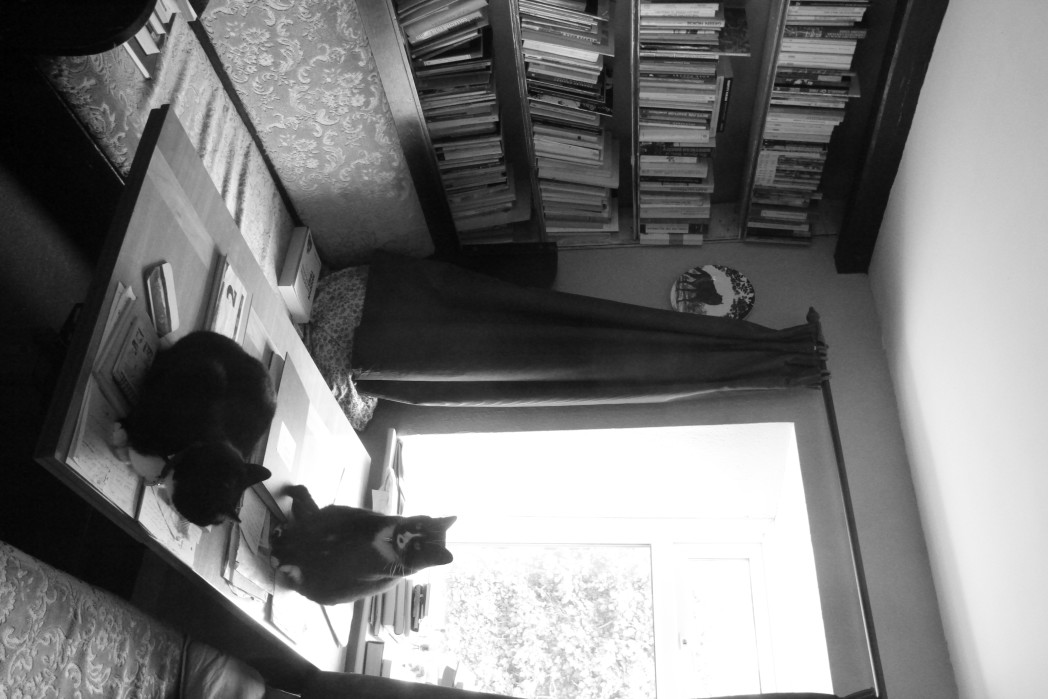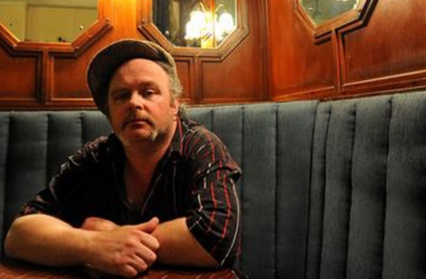Aberystwyth-based and Toxteth-born Niall Griffiths has a reputation for hard-hitting fiction, of which his most celebrated novels, such as Grits (2000) and Sheepshagger (2001), are set in Wales. His 2002 book, Kelly + Victor, was made into an award-winning movie by Kieran Evans in 2012, and in 2003 his novel Stump cleaned up on the literary awards circuit in Wales. Griffiths has published several books of non-fiction in recent years, as well as his first poetry collection, but it is with the sharp edge of his fiction where he is most effective, and in 2013 his novel about celebratory culture, A Great Big Shining Star, received rave reviews, not least in this publication.

There are a couple of rooms in the house in which I write – the garden too, in good weather, although birds and insects and flowers are constant distractions – but this is where the bulk of the first-draft longhand stuff gets done. It doubles up as the dining table. The bench is from a pub, and was bought from the recycling place in Aberystwyth, which is superb. Facing it, out of frame, is its twin; they’ve followed me to different addresses. They’ve been repaired several times and will no doubt need repairing again but I’d sooner do that than replace them; my body knows them now, and they know my body, and the jigsaw fit is a comfortable, welcoming one. Plus they’re the perfect length for a nap; not long enough, or soft enough, for a stretched-out deep sleep, just the right length for a snatch of shut-eye until the awakening cramps. The visible shelves hold, on the top two, poetry anthologies, and below them, modern British and Irish poetry. The reference library is upstairs, in the study, which I use largely for reading, not writing (it also doubles as a spare room); the laptop travels from room to room, wherever I may need it. Out of shot, to the right, are shelves which hold older poetry collections and poetry in translation.
The cats are siblings; I have three from the same litter but one mainly lives outside. They’re semi-feral, and the veneer of domestication is a very, very thin one. The tomcat – nearest the window – is an incredibly accomplished hunter; I wish he wasn’t, but, well, he’s a cat. The bells on his collar mean that he very rarely catches birds but most other things are game to him, even rabbits, often larger than himself; he wrestles their broken-necked floppy bodies through the catflap when I’m asleep. And weasels, and moles, and of course mice and rats. Were I a carnivore, I could eat what he brings me; I’d have a regular supply of coney. He and his sister often make camp on this table and so the papers on it are mottled with paw-prints and specks of blood; sometimes the cats will return from their forays with gory paws, like gangland enforcers at wet-work. They can distract from work, yes, when they bat the pen or solicit for physical affection, but generally they’re a spur and an inspiration; their inherent elegance and grace, their utter self-containment, their embodiment of in-the-moment-vividness and wildness – the qualities I aim for, and feel (hope) that I attain and generate, when the words are torrenting out.
Beyond the window is the lane, seldom used by human traffic. Through it I watch the sparrows squabbling or taking dust-baths or gathering nesting material. A decade or so ago, on one of my first days working at this table, I was startled by a loud thud against the window. Outside, a thrush was on its back below the ledge, legs stiff, wings thrashing. I brought it inside and put it in a box. An hour later I could hear it in there, active, beginning to panic. I took the box into the garden where, in response to the ambient noise, the bird in the box began to sing; astonishingly loud, at such close proximity. The box thrummed and throbbed in my arms. The instant I opened it the thrush was yanked into the sky as if on elastic. A beautiful moment, but I’m glad it hasn’t happened since; the bird’s initial pain and distress was painful to witness. But it was only stunned.
When I’m away, I long for this table, and that bench, and those little lions, and the little birds in the lane.
Niall Griffiths’ Writers’ Room piece is a part of a Wales Arts Review series.












